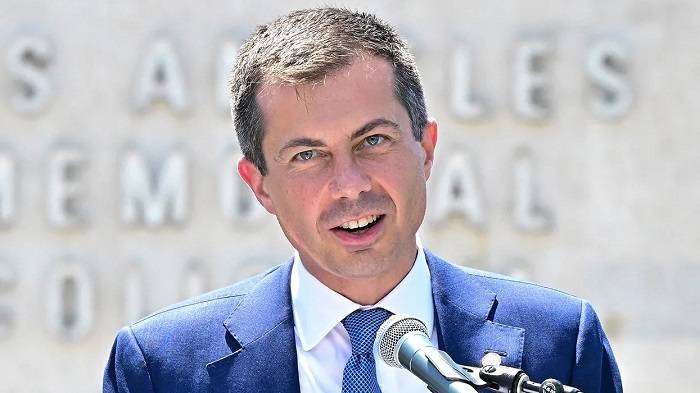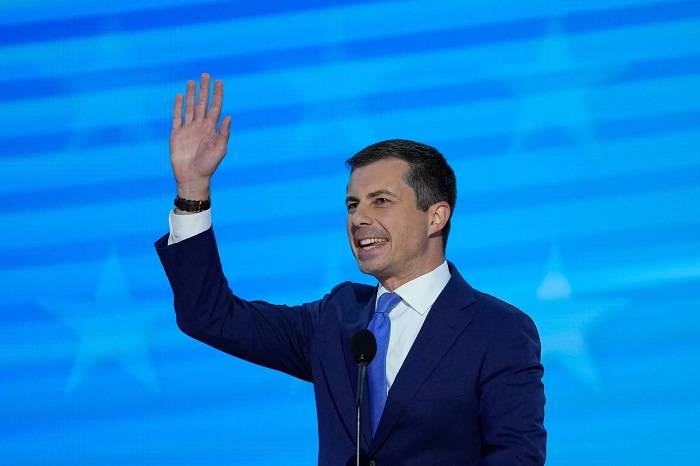Pete Buttigieg, the current U.S. Secretary of Transportation and former Mayor of South Bend, Indiana, has emerged as one of the most influential figures in American politics. Known for his intellectual prowess, military service, and progressive vision, Buttigieg has carved out a significant role in the Biden administration. This comprehensive guide will delve into the benefits of Pete Buttigieg’s work, focusing on his contributions to transportation, infrastructure, social equity, and more.
Background and Rise to Prominence
Early Life and Education
Pete Buttigieg was born on January 19, 1982, in South Bend, Indiana. His parents were both professors, which contributed to his intellectual upbringing. Buttigieg attended Harvard University, where he studied history and literature, and later went on to earn a Rhodes Scholarship to study at Oxford University. His academic achievements laid a strong foundation for his future career in public service.
Military Service
Buttigieg’s military service is one of the defining aspects of his character. He served as an intelligence officer in the U.S. Navy Reserve and was deployed to Afghanistan in 2014. His experience in the military not only provided him with leadership skills but also a deep understanding of the complexities of global politics and national security.
Political Career
Buttigieg’s political career began with his election as Mayor of South Bend in 2011, making him one of the youngest mayors in American history. His tenure as mayor was marked by efforts to revitalize the struggling city, improve public services, and address social inequalities. His successful mayoral term paved the way for his run for the Democratic presidential nomination in 2020, where he gained national recognition.
Contributions as Secretary of Transportation
Modernizing American Infrastructure
As the U.S. Secretary of Transportation, Buttigieg has played a pivotal role in modernizing America’s infrastructure. His leadership has been instrumental in advancing the Biden administration’s ambitious infrastructure plan, which aims to rebuild roads, bridges, and railways across the country. This modernization effort is expected to create millions of jobs, reduce transportation costs, and improve the overall efficiency of the American economy.
Key Benefits:
- Job Creation: The infrastructure plan spearheaded by Buttigieg is projected to create millions of jobs in construction, engineering, and related sectors.
- Economic Growth: Improved transportation networks will boost commerce, reduce travel times, and enhance the overall productivity of the nation.
- Sustainability: Buttigieg has emphasized the importance of sustainable infrastructure, promoting investments in public transit and electric vehicles.
Promoting Transportation Equity
Buttigieg has been a vocal advocate for transportation equity, ensuring that all communities, regardless of income or race, have access to safe and reliable transportation. His policies aim to reduce the disparities that exist in transportation access, particularly in underserved communities.
Key Benefits:
- Accessibility: Investments in public transportation and infrastructure in low-income and rural areas will increase accessibility and mobility for all citizens.
- Safety: Buttigieg’s focus on improving road safety and reducing traffic fatalities benefits all Americans, particularly in marginalized communities.
- Environmental Justice: By promoting sustainable transportation options, Buttigieg is also addressing the environmental impacts of transportation on disadvantaged communities.
Environmental and Climate Initiatives
Advancing Electric Vehicles
One of Buttigieg’s key priorities has been the promotion of electric vehicles (EVs) as part of the broader effort to combat climate change. Under his leadership, the Department of Transportation has supported the expansion of EV charging infrastructure and provided incentives for the adoption of electric vehicles.
Key Benefits:
- Reduction in Emissions: The shift to electric vehicles will significantly reduce greenhouse gas emissions, contributing to the fight against climate change.
- Economic Opportunities: The growth of the EV industry is expected to create new jobs in manufacturing, technology, and energy sectors.
- Energy Independence: By reducing reliance on fossil fuels, the U.S. can achieve greater energy independence and security.
Supporting Sustainable Public Transit
Buttigieg has also been a strong advocate for sustainable public transit systems. He has worked to secure funding for the development and expansion of public transportation networks, including buses, trains, and light rail systems, that run on clean energy.
Key Benefits:
- Reduced Carbon Footprint: Sustainable public transit reduces the carbon footprint of daily commutes, contributing to cleaner air and a healthier environment.
- Social Equity: Expanding public transit provides affordable and accessible transportation options for all citizens, particularly those in urban and underserved areas.
- Urban Development: Improved public transit can lead to more sustainable urban development, reducing congestion and promoting more livable cities.
Social Impact and Community Development
Revitalizing Urban Areas
Building on his experience as Mayor of South Bend, Buttigieg has emphasized the importance of revitalizing urban areas as part of his transportation agenda. His policies focus on transforming neglected urban spaces into vibrant, economically thriving communities.
Key Benefits:
- Economic Revitalization: Investments in infrastructure and public services can lead to economic growth in urban areas, attracting businesses and creating jobs.
- Improved Quality of Life: Revitalized urban areas provide residents with better housing, public spaces, and services, enhancing their overall quality of life.
- Community Engagement: Buttigieg’s approach emphasizes community involvement in urban development, ensuring that residents have a say in the changes that affect their neighborhoods.
Addressing Racial and Social Disparities
Buttigieg has made it a priority to address the racial and social disparities that exist within the transportation sector. His policies aim to correct the historical inequities that have disadvantaged minority communities in terms of access to transportation and infrastructure.
Key Benefits:
- Equitable Access: By focusing on transportation equity, Buttigieg’s policies ensure that all communities have fair access to transportation resources.
- Job Opportunities: His initiatives promote diversity and inclusion in the transportation workforce, creating job opportunities for underrepresented groups.
- Civic Engagement: Buttigieg encourages the participation of marginalized communities in transportation planning, giving them a voice in decisions that impact their lives.
Challenges and Criticisms
Addressing Supply Chain Issues
One of the significant challenges Buttigieg has faced as Secretary of Transportation is the ongoing supply chain crisis, exacerbated by the COVID-19 pandemic. His efforts to address these issues have included working with various stakeholders to reduce bottlenecks and improve the efficiency of supply chains.
Key Challenges:
- Global Disruptions: The pandemic has caused unprecedented disruptions to global supply chains, making it a complex issue to address.
- Infrastructure Limitations: The outdated infrastructure in many parts of the U.S. has further complicated efforts to streamline supply chains.
- Coordination: Coordinating efforts across federal, state, and local levels, as well as with private companies, has been a significant challenge in resolving supply chain issues.
Criticisms and Public Perception
Like any public figure, Buttigieg has faced criticism and scrutiny. Some have criticized the pace of his initiatives, while others have questioned the feasibility of his ambitious plans. However, Buttigieg has remained focused on his goals, often addressing criticisms with transparency and a willingness to engage in dialogue.
Key Criticisms:
- Pace of Progress: Some critics argue that the pace of infrastructure improvements and transportation reforms has been slower than expected.
- Feasibility of Goals: The ambitious nature of Buttigieg’s plans, particularly regarding climate initiatives, has led to questions about their practicality.
- Public Communication: Buttigieg’s communication style, while articulate, has sometimes been perceived as overly intellectual, which may not resonate with all audiences.
Future Outlook and Legacy
Long-Term Vision
Pete Buttigieg’s long-term vision for the Department of Transportation involves creating a more connected, equitable, and sustainable transportation system. His focus on modernizing infrastructure, promoting green transportation, and addressing social inequities will likely continue to shape his work in the coming years.
Key Benefits:
- Sustainable Future: Buttigieg’s commitment to green transportation and infrastructure will contribute to a more sustainable future for the U.S.
- Economic Growth: Continued investments in transportation and infrastructure are expected to drive economic growth and innovation.
- Social Equity: His emphasis on equity and inclusion in transportation will help address long-standing disparities and promote social justice.
Potential Political Future
Given his achievements and growing influence, many speculate about Buttigieg’s future in American politics. Whether he continues in his current role or seeks higher office, his impact on transportation and infrastructure policy will likely remain a significant part of his legacy.
Potential Pathways:
- Continued Leadership: Buttigieg may continue to lead the Department of Transportation, further advancing his policy goals and solidifying his legacy.
- Higher Office: His national profile and experience make him a potential candidate for higher political office, including another presidential run.
- Influence on Policy: Even beyond his current role, Buttigieg’s ideas and initiatives will likely influence transportation and infrastructure policy for years to come.
Related Post:
Pete Buttigieg has already made a significant impact on American transportation and infrastructure policy. His work as Secretary of Transportation has focused on modernizing infrastructure, promoting sustainability, and addressing social disparities. While he faces challenges and criticisms, his long-term vision and dedication to public service continue to drive his efforts. As he looks to the future, Buttigieg’s contributions are likely to leave a lasting legacy in American politics and public policy.
This comprehensive guide highlights the many benefits of Pete Buttigieg’s work, offering a detailed look at his achievements and the positive impact they have on the country.




